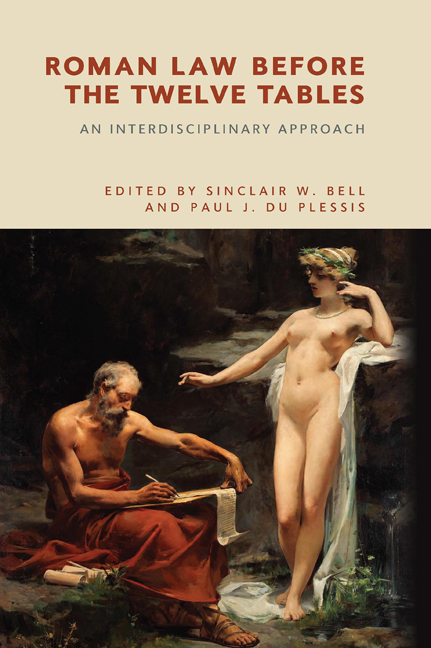Book contents
- Frontmatter
- Contents
- The Contributors
- Introduction: The Dawn of Roman Law
- Part I The Materiality of Roman Law: New Archaeological Discoveries
- 1 Roman Law in its Italic Context
- 2 Central Italian Elite Groups as Aristocratic Houses in the Ninth to Sixth Centuries BCE
- 3 Authority and Display in Sixth-Century Etruria: The Vicchio Stele
- Part II Constructing Early Roman Law: Sources and Methods
- 4 The Twelve Tables and the leges regiae: A Problem of Validity
- 5 The leges regiae in Livy: Narratological and Stylistic Strategies
- 6 The leges regiae through Tradition, Historicity and Invention: A Comparison of Historico-literary and Jurisprudential Sources
- 7 The Laws of the Kings – A View from a Distance
- 8 Beyond the Pomerium: Expansion and Legislative Authority in Archaic Rome
- Part III Roman Law in Historiography and Theory
- 9 Niebuhr and Bachofen: New Forms of Evidence on Roman History
- 10 Finding Melanesia in Ancient Rome: Mauss’ Anthropology of nexum
- Index
10 - Finding Melanesia in Ancient Rome: Mauss’ Anthropology of nexum
Published online by Cambridge University Press: 22 September 2020
- Frontmatter
- Contents
- The Contributors
- Introduction: The Dawn of Roman Law
- Part I The Materiality of Roman Law: New Archaeological Discoveries
- 1 Roman Law in its Italic Context
- 2 Central Italian Elite Groups as Aristocratic Houses in the Ninth to Sixth Centuries BCE
- 3 Authority and Display in Sixth-Century Etruria: The Vicchio Stele
- Part II Constructing Early Roman Law: Sources and Methods
- 4 The Twelve Tables and the leges regiae: A Problem of Validity
- 5 The leges regiae in Livy: Narratological and Stylistic Strategies
- 6 The leges regiae through Tradition, Historicity and Invention: A Comparison of Historico-literary and Jurisprudential Sources
- 7 The Laws of the Kings – A View from a Distance
- 8 Beyond the Pomerium: Expansion and Legislative Authority in Archaic Rome
- Part III Roman Law in Historiography and Theory
- 9 Niebuhr and Bachofen: New Forms of Evidence on Roman History
- 10 Finding Melanesia in Ancient Rome: Mauss’ Anthropology of nexum
- Index
Summary
INTRODUCTION
Marcel Mauss’ The Gift is an original and unique anthropology of law. Law is the object and medium of the analysis, and the conceptual and political strategies of the text are closely adapted to the symptomatic tensions that Mauss elicits from law. And for Mauss these tensions were concentrated in one particular legal institution – the archaic Roman institution of nexum. In the early twentieth century, the legal-historical debate about the technicalities of nexum was sufficiently intense as to be described as ‘volcanic’. Events that qualify as seismic in the field of legal history may not have such effects elsewhere, so it is interesting that the question of nexum became a central concern of sociology and ethnography in early twentiethcentury France. Ludwig Mitteis had set off the legal-historical debate in a text published in 1901, which was followed in the next decade or so by a number of responses and syntheses. Many of these accounts of nexum were noticed in L’Année sociologique, the house journal of the Durkheimians, and the journal in which the text of The Gift first appeared. Most of these notices were written by Mauss’ collaborator Paul Huvelin, who also published his own brief essay on nexum; these, together with the studies of Georges Davy, had familiarised Mauss with the intricacies of nexum. The interest of Mauss and his collaborators emerged from a broader comparative investigation of the institution of contract, which drew together the study of law, magic, and religion. In The Gift, Mauss reframed the terms of this investigation quite radically: first, by hybridising history and ethnography to generate a novel apprehension of ‘the archaic’; second, and more importantly, by turning this relation to the archaic into the medium of a critical political project, which held European society up to a still vital legacy of its own past.
Nexum was originally the form taken by a loan made by patrician to plebeian. A quantity of bronze bullion representing the sum borrowed was weighed out in the presence of a libripens and five witnesses, and this ritual, together with the verbal formulae uttered by the parties, created a bond under which the borrower effectively pledged himself as security for the loan.
- Type
- Chapter
- Information
- Roman Law before the Twelve TablesAn Interdisciplinary Approach, pp. 171 - 198Publisher: Edinburgh University PressPrint publication year: 2020



